|
|
|
Sort Order |
|
|
|
Items / Page
|
|
|
|
|
|
|
| Srl | Item |
| 1 |
ID:
138929
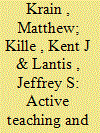

|
|
|
|
|
| Summary/Abstract |
Recent developments in globalization, education, and technology suggest exciting possibilities for cross-national active teaching and learning in international studies. This paper reviews scholarship on the potential for systematic and intentional cross-national pedagogical innovations in international studies. Three critical themes are identified and explored: culture and cross-national education, collaboration across contexts, and the need for systematic assessment. Each plays an important role in facilitating effective active teaching and learning cross-nationally. A broader examination of the opportunities and challenges of cross-national education in international studies suggests guidelines for a systematic, collaborative cross-national approach to an emerging active teaching and learning research agenda.
|
|
|
|
|
|
|
|
|
|
|
|
|
|
|
|
| 2 |
ID:
145738
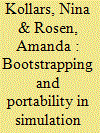

|
|
|
|
|
| Summary/Abstract |
Despite the existence of a large literature on the use and effectiveness of simulations as part of the active learning pedagogical toolbox, simulations have yet to achieve wide adoption rates among college instructors. One of the principal constraints is time: traditionally, most simulations require extensive time for the faculty to design, prepare, and use in the classroom setting. This article examines two design features of simulations aimed at solving this problem—portability, where simulations are designed as a framework that can be used for different subjects, classes, and disciplines; and bootstrapping, or the tying of the simulation content to commonly known fictional or pop-culture scenarios. Combined, these two features can reduce some of the barriers to simulation use in the classroom. We conclude by illustrating both principles with a sample simulation called “The Trial of Goldilocks.”
|
|
|
|
|
|
|
|
|
|
|
|
|
|
|
|
| 3 |
ID:
087275


|
|
|
|
|
| Publication |
2009.
|
| Summary/Abstract |
Despite a longstanding focus on the systemic distribution of power in the study of international relations, scholarship during the past 20 years increasingly emphasizes the role of domestic politics in foreign-policy-decision making. This simulation enables participants to experience negotiating an international issue-a territorial dispute between two fictitious states, Chinazambia and Boliviafranca-in the context of this "two-level game" between domestic and international environments. The simulation furnishes a vantage point from which students can assess realist, liberal, and alternative theoretical perspectives on international relations as they affect policy making. The simulation is flexible and can be executed under a variety course contexts, as well as time and participation constraints. Additionally, the simulation provides ample opportunity for a number of enriching postsimulation activities.
|
|
|
|
|
|
|
|
|
|
|
|
|
|
|
|
| 4 |
ID:
084677
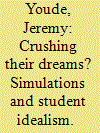

|
|
|
|
|
| Publication |
2008.
|
| Summary/Abstract |
In-class simulations can offer students an excellent opportunity to apply the lessons they have learned in a practical and fun manner. The literature on active learning in international relations demonstrates the many values simulations possess. In running a simulation on the conflict in Darfur, I identified an additional potential value in in-class simulations: they can be a technique for tempering student idealism. Students often fail to appreciate the disconnect between their personal political convictions and the political realities that impede conflict resolution. Simulations allow students to apply theory to practice in a way that encourages students to temper their idealism by acknowledging political realities on the ground. I discuss how a week-long simulation on Darfur encouraged students to balance idealism and realism and understand why reaching agreements in the international community can be so difficult.
|
|
|
|
|
|
|
|
|
|
|
|
|
|
|
|
| 5 |
ID:
090656
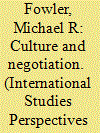

|
|
|
|
|
| Publication |
2009.
|
| Summary/Abstract |
This article examines one especially challenging aspect of active-learning international studies courses-the use of cross-cultural simulations. What is the significance of culture for negotiation? What difficulties might cross-cultural negotiations pose, and how might negotiators work with cultural differences to achieve successful outcomes? Is it possible to model the effects of cultures on negotiators in a classroom role-play? What are the advantages to using cross-cultural simulations, and what difficulties do they entail? How might an instructor make best use of materials that focus on cultural issues and their effect on negotiation? When teaching students of different cultures by active-learning methods, what ought an instructor to bear in mind? What cross-cultural simulations are available, and what readings might be assigned to accompany them?
|
|
|
|
|
|
|
|
|
|
|
|
|
|
|
|
| 6 |
ID:
117731
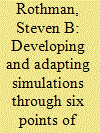

|
|
|
|
|
| Publication |
2012.
|
| Summary/Abstract |
The essay describes a new way to evaluate variation among simulations through six distinct categories. The six points involve the content of the simulation, the integration of the simulation with other aspects of the course, the length of a simulation, the strictness of rules, the interaction among students during the simulation, and assessment techniques. The essay assesses the benefits and costs of the simulation and course design through student feedback and instructor evaluation. In addition, the essay uses these six points of variation as a framework to explain a sample simulation integrated with course objectives, goals, lecture material, two short research essays, and other class activities designed to teach game theory applied to current international problems. The simulation uses current world issues to help students incorporate class content, game theoretic modeling, and strategic interaction into an international negotiation conducted in class.
|
|
|
|
|
|
|
|
|
|
|
|
|
|
|
|
| 7 |
ID:
097846
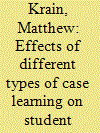

|
|
|
|
|
| Publication |
2010.
|
| Summary/Abstract |
Two types of case learning-case studies and problem-based learning-have become staples in our active learning international relations classrooms. Yet few teacher-scholars have examined whether different types of case learning yield different learning outcomes. This study examines the student engagement in response to four different types of case learning: case studies with texts designed for the case method, those using written nontraditional case materials, those incorporating documentary films as case materials, and problem-based learning approaches. I survey students in two International Political Economy classes as a way of yielding an indirect assessment of how effective or useful these different approaches are, and which types of case learning engaged students most. Results suggest that the types of case learning that engaged students' senses in multiple ways-problem-based learning and case studies using films as texts-enhanced their perceptions of the exercises' effectiveness. Case studies that relied on written texts alone were not rated as highly, although were still seen as extremely valuable. These results are consistent with the findings from the cognitive psychology literature that informs the active teaching and learning approach.
|
|
|
|
|
|
|
|
|
|
|
|
|
|
|
|
| 8 |
ID:
084000
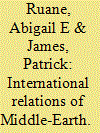

|
|
|
|
|
| Publication |
2008.
|
| Summary/Abstract |
This article demonstrates how by using J.R.R. Tolkien's Lord of the Rings (LOTR) as a text in the classroom instructors can relay the international relations (IR) "Great Debates" and feminist "waves" to students through the framework of "where you stand depends on where you sit." It overviews how J.R.R. Tolkien's acclaimed trilogy is relevant to learning about IR and then presents a number of "cuts" into using LOTR to inform IR teaching of both problem solving and critical theory. It begins by parsing the three "Great Debates" of IR theory and three "waves" of feminist theory in terms of different worldviews by relating them to characters from the trilogy. Next, the paper suggests that a critical evaluation of this analysis conveys that concerns, goals, and understandings of problems and insecurities are influenced (although not determined) by context, such as gender, race, class, sexuality, and postcolonial position. It concludes by suggesting that further use of popular culture and the humanities can help IR teaching both illustrate and critically reflect on IR scholarship.
|
|
|
|
|
|
|
|
|
|
|
|
|
|
|
|
| 9 |
ID:
145739
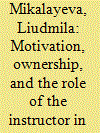

|
|
|
|
|
| Summary/Abstract |
This article systematizes recently published accounts and the author’s experience on motivation, learning process ownership, and the role of the instructor in active learning methods, such as role-plays. It argues that active learning is most productive when the instructor creates and consistently enforces a stable and clear framework of rules. Active learning methods often produce higher levels of motivation, thanks to a greater visibility of students’ efforts, higher stakes of success within a competitive collaborative setup, and a greater ownership of the whole process by students. High levels of motivation arguably improve the quality and depth of learning. Novice users of active learning may, therefore, perceive that the self-effacement of the instructor in a fully horizontal cooperative setting is the right way to optimize learning outcomes. However, ownership and increased motivation are likely to create several problems—overmotivation, confusion, alienation, and hostility—that can be solved best by the instructor. This article uses a conceptualization of the student–instructor relationship in which cooperation and dominance are not mutually exclusive and claims that instead of self-effacement, a cooperative, but authoritative, relationship between students and instructor maximizes the learning potential in active learning settings..
|
|
|
|
|
|
|
|
|
|
|
|
|
|
|
|
| 10 |
ID:
084676
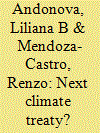

|
|
|
|
|
| Publication |
2008.
|
| Summary/Abstract |
Scholars and policy pundits have advanced more than thirteen different designs of a climate change treaty to succeed the Kyoto Protocol. Each of these designs claims to correct the defects of the current agreement. But what kind of a treaty is likely to pass the test of international and domestic politics and negotiations? Can we learn something about the hurdles and opportunities for climate cooperation from negotiations simulations in the classroom? The paper engages these questions by analyzing an experimental course design organized around simulated negotiations of the next climate change treaty. Unlike classroom simulations which rely on hypothetical scenarios, this course sought to approximate actual domestic and international constraints within which countries negotiate. The paper details the structure of the course, the ways in which it familiarizes students with domestic and international climate politics, and the components of the negotiations module. The analysis examines the pedagogical impact and policy learning associated with the simulation and draws conclusions about the broader applicability of this approach.
|
|
|
|
|
|
|
|
|
|
|
|
|
|
|
|
| 11 |
ID:
149108
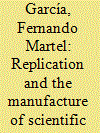

|
|
|
|
|
| Summary/Abstract |
The field of replication studies remains a controversial, misunderstood, and unappreciated piñata of 18 replication typologies spanning 79 replication types. To help bring order to the chaos, I contribute a theory of manufactured inferences. The theory is built on three pillars: (1) replication causal diagrams (or r-dags for short), (2) a formal conceptualization of study procedures, and (3) the use of Bayesian inference to update our beliefs about the natural phenomenon under investigation and the operating characteristics of the study procedures used to study it. I use this theory to motivate a formal typology of replication types, explaining how they are done and for what purpose. Finally, I discuss some implications of this theory, including the importance of an analytical approach to robustness and generalizability replications, the need to avoid conceptual replications, the possibility of legitimate (unplanned) specification searches, the limitations of meta-analysis, and the false dichotomy between so-called successful and failed replications.
|
|
|
|
|
|
|
|
|
|
|
|
|
|
|
|
| 12 |
ID:
158625
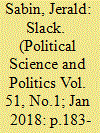

|
|
|
|
|
| Summary/Abstract |
Online learning in postsecondary institutions has increased dramatically across the United States and Canada. Although research demonstrates the benefits of online learning for student success, instructors face challenges in facilitating communication, delivering course content, and navigating outdated and cumbersome technologies. The authors examine the use of a free third-party platform called Slack as a tool to facilitate better communication among students and faculty, enable the delivery of diverse and dynamic course content, and reach students in an online course that supports both independent and collaborative learning. The authors present a case study of Slack’s use in an online second-year environmental politics course taught at a large Canadian public university. There is a significant and growing literature on how to best engage students in online learning, including active and social learning models as promising approaches to digital teaching. The authors argue that using collaborative social technologies such as Slack—which both replicates and integrates the online and social-media environments that students already inhabit—can assist faculty in meeting their pedagogical goals online. The article documents the instructors’ experience in managing discussion and involving students in their online learning through active learning exercises. Best practices are examined.
|
|
|
|
|
|
|
|
|
|
|
|
|
|
|
|
| 13 |
ID:
068948
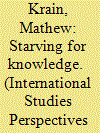

|
|
|
| 14 |
ID:
095642


|
|
|
|
|
| Publication |
2010.
|
| Summary/Abstract |
Instead of always teaching students how to succeed-as is the norm in higher education-it might also be useful to teach them about failure. Understanding failure (that is, why actors fail to reach common objectives in inter-group settings) gives students deeper insight into how to resolve global problems, and the conditions under which success can be achieved. This enhances student awareness of complexity in world affairs, including the nature of inter-group relations. Simulations are a good way to teach students about the possibility of failure, and how to learn from it, because they allow students to go through the learning process on their own. In this article I discuss how a simulation I ran on Middle Eastern politics can be used as an example of how to instruct students about failure as much as about success.
|
|
|
|
|
|
|
|
|
|
|
|
|
|
|
|
| 15 |
ID:
061901


|
|
|
| 16 |
ID:
084001
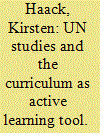

|
|
|
|
|
| Publication |
2008.
|
| Summary/Abstract |
Active learning as a means to achieve qualitative, that is "deep," learning has become an accepted form of learning and teaching in higher education. The subject of UN studies has been at the forefront of active learning since the introduction of Model United Nations in the early twentieth century. However, the fact that active learning has become "fashionable" raises the question of whether its application continues to achieve its intentions and therefore its full potential. This article questions the promise of active learning in UN studies by analyzing the way in which students learn about the UN, be that in Model United Nations simulations or in the classroom. It demonstrates how conventions of UN teaching (and research) obstruct the achievement of true deep learning and develops principles for a new curriculum that acts as active learning tool, that is, one that supports students understanding of the subject. These principles are developed into outlines of "best practice" curricula.
|
|
|
|
|
|
|
|
|
|
|
|
|
|
|
|
| 17 |
ID:
050952
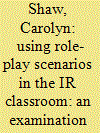

|
|
|
|
|
| Publication |
Feb 2-16, 2000.
|
|
|
|
|
|
|
|
|
|
|
|
|
|
|
|
| 18 |
ID:
087997
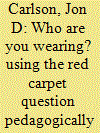

|
|
|
|
|
| Publication |
2009.
|
| Summary/Abstract |
This paper presents an active learning module design and implementation strategy for use in an undergraduate course on globalization, world politics, international political economy, or international relations. Students are first asked to conduct research on their wardrobe and its origins by country, allowing for classroom discussion of research methods and designs. Results are submitted, along with a short response essay. This is evaluated in conjunction with a case-study short reading and shared discussion, followed by a short video/multimedia presentation on free trade and labor issues. Drawing on literature on active learning, I argue that this presents a more cohesive approach for engaging students in the material on a substantive level, while at the same time allowing them to actively appreciate and understand such diverse concepts as commodity chains, free trade zones, fair trade versus free trade, gendered divisions of labor, consumer responsibility, research methodologies, and macroeconomic shifts in employment across nations. This also serves as a rubric for instructors to use in creating their own topical "modules." Preliminary data and classroom results are discussed, as are additional strategies for lesson development.
|
|
|
|
|
|
|
|
|
|
|
|
|
|
|
|
| 19 |
ID:
119406


|
|
|
|
|
| Publication |
2013.
|
| Summary/Abstract |
Interest in zombies is booming across campuses. International Relations (IR) scholars have likewise begun to pay attention to the undead, as the zombie invasion scenario-envisioned in a variety of movies, television shows, and books-brings to bear many of the key issues and controversies of international relations theory. Here I provide some concrete suggestions for incorporating zombies into undergraduate classes. Drawing from a leading book in this genre (World War Z), I sketch out some of the ways that the zombie wars can be applied to key issues taught in introductory-level IR classes. I then provide specific suggestions to incorporating these insights into the classroom, including discussion guides and simple role-playing exercises.
|
|
|
|
|
|
|
|
|
|
|
|
|
|
|
|
|
|
|
|
|